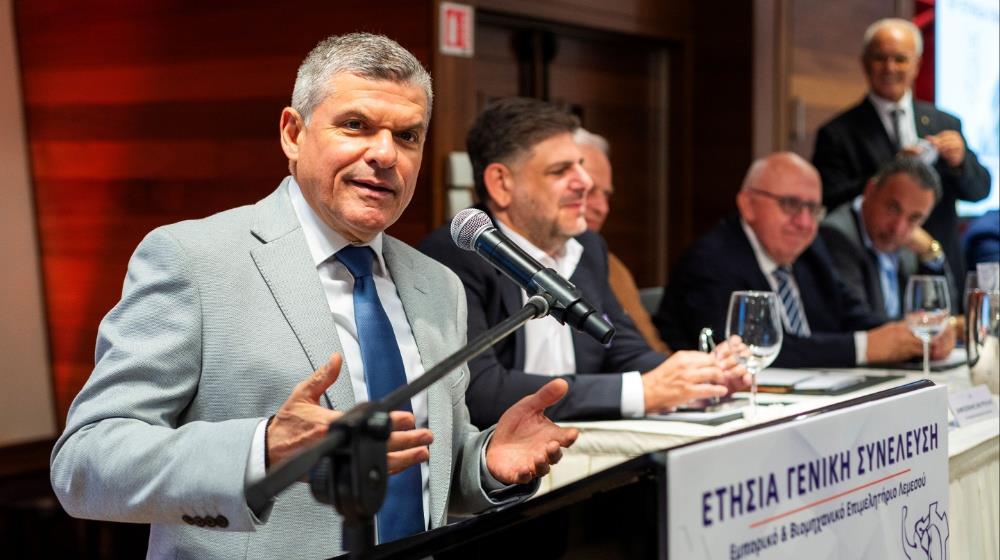Close cooperation is essential to achieving the shared goals of the Government and the business community, namely green and digital transformation, enhancing competitiveness, and upgrading Cyprus’ international image, Minister of Energy, Commerce and Industry, George Papanastasiou said at the recent 63rd Annual General Assembly of the Limassol Chamber of Commerce and Industry (LCCI).
In his speech, the Minister said that Limassol “is moving dynamically into a new era of growth and extroversion, with modern infrastructure and strategic planning that strengthen its role as a key economic, maritime and tourism hub of our country.” He underlined that the contribution of the city’s vibrant business community is crucial in this process.
He further assured that in these efforts, “the Government remains a steadfast supporter, providing tangible and multifaceted assistance” to the country’s enterprises, noting that his Ministry is implementing targeted policies and support programmes aimed at boosting innovation, developing the manufacturing sector, and advancing the digital and energy transformation of businesses.
Papanastasiou recalled that for the programming period 2021-2027, a total of €226 million has been secured under the “THALIA” EU programme, along with €137 million from the EU’s Recovery and Resilience Facility and the REPowerEU Plan, to implement various schemes promoting entrepreneurship and industry.
To date, he said, grants amounting to €101.2 million have been disbursed to beneficiaries of the Ministry’s schemes - €88.9 million through the “THALIA” programme and €12.3 million via the Recovery and Resilience Plan. These, he added, include initiatives supporting new entrepreneurship, energy upgrades for residences, competitiveness of manufacturing SMEs, digital transformation of businesses, processing and/or marketing of agricultural products, and investment in energy efficiency.
Addressing the issue of energy costs, the Minister stressed that it remains a critical factor for maintaining and enhancing the competitiveness of Cypriot enterprises. “The Government, recognising these challenges, has undertaken targeted actions,” he said.
“Our top priority at the Ministry of Energy, Commerce and Industry remains the full utilisation of European funds for improving the energy efficiency of businesses and promoting energy storage systems,” he added.
Referring to the country’s 14 industrial zones, which host around 950 enterprises, Papanastasiou stressed that “their upgrade and modernisation, in cooperation and consultation with local authorities and competent bodies such as the district Chambers of Commerce and Industry and the Industrialists’ Associations, remain a firm priority.” He noted that in 2025 alone, projects totalling €8 million are being advanced, including the completion of the Energy and Industrial Area of Vasilikos.
“Close cooperation is essential to achieving our common goals,” he said, adding that “if we want to accomplish the green and digital transformation of Cypriot enterprises, strengthen competitiveness, and elevate Cyprus’ image internationally, we must work collectively and in coordination.” He reaffirmed that his Ministry “will continue to stand as a supporter and ally of your initiatives.”
Papanastasiou also referred to Cyprus’ upcoming Presidency of the Council of the European Union, which begins on January 1, 2026, noting that Cyprus’ efforts will focus on strengthening the competitiveness of European businesses, adding that to achieve this requires energy autonomy. He said that this was “a very difficult goal, as resources are limited.”
During Cyprus’ Presidency, he said, “one of the key pillars will be strengthening Europe’s energy networks to make them smarter and capable of managing various forms of energy.” Another pillar, he added, “will be to foster an understanding in Europe that we do not have the luxury of rejecting any form of energy or technology.”
Although green transition is the main objective, he stressed, “we must also recognise that there are other technologies, such as natural gas and nuclear energy, and we cannot prescribe only one solution, as this creates rigidity and undermines the competitiveness of European industry.”
(Source: CNA)









